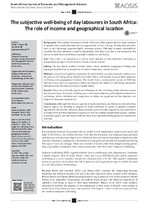| dc.contributor.author | Blaauw, Phillip F. | |
| dc.contributor.author | Botha, Ilse | |
| dc.contributor.author | Schenck, Catherina | |
| dc.date.accessioned | 2018-05-07T13:31:09Z | |
| dc.date.available | 2018-05-07T13:31:09Z | |
| dc.date.issued | 2018 | |
| dc.identifier.citation | Blaauw, P.F. et al. (2018). The subjective well-being of day labourers in South Africa: The role of income and geographical location. South African Journal of Economic and Management Sciences, 21(1): a2087. | en_US |
| dc.identifier.issn | 1015-8812 | |
| dc.identifier.uri | http://dx.doi.org/10.4102/ sajems.v21i1.2087 | |
| dc.identifier.uri | http://hdl.handle.net/10566/3639 | |
| dc.description.abstract | Background: The informal economy in South Africa provides employment to large numbers
of people who would otherwise have no opportunity to earn a living. Yet informal activities,
such as day labouring, generate highly uncertain returns. Although it seems reasonable to
conclude that day labourers would be dissatisfied with their lives, this is not necessarily the
case as several factors contribute to people’s subjective well-being.
AIM: This study is in response to a call for more research on the subjective well-being of
marginalised groups in South Africa’s informal labour market.
SETTING: The day labour market in South Africa, whose members congregate at hiring sites
hoping to be picked up by passers-by in need of temporary, casual workers.
METHODS: Using Sen’s Capability Approach, the study builds on earlier research conducted on
the general well-being of day labourers in South Africa, with specific focus on their subjective
well-being and geographical location. The results from a countrywide survey of 3830 day
labourers were used in a regression analysis to compare the subjective well-being among day
labourers across the nine provinces of South Africa.
RESULTS: There are statistically significant differences in the well-being of day labourers across
the nine provinces. Economic variables play a role in both objective and subjective measures of
well-being, while attitudinal and comparison variables are significant for the objective and
subjective measures, respectively.
CONCLUSIONS: Although they have to operate in harsh conditions, day labourers in South Africa
display agency by choosing to migrate to richer provinces in search of greater economic
opportunity and reward. However, these potential gains are often negated by increased levels
of competition and thus depressed wage levels. How to nurture marginalised groups’ abilities
to exercise agency and take more control of their lives represents fertile ground for researchers
in future. | en_US |
| dc.language.iso | en | en_US |
| dc.publisher | AOSIS | en_US |
| dc.rights | © 2018. The Authors.
Licensee: AOSIS. This work
is licensed under the
Creative Commons
Attribution License. | |
| dc.subject | Informal economy | en_US |
| dc.subject | South Africa | en_US |
| dc.subject | Day labourers | en_US |
| dc.subject | Income | en_US |
| dc.subject | Geographical location | en_US |
| dc.title | The subjective well-being of day labourers in South Africa: The role of income and geographical location | en_US |
| dc.type | Article | en_US |
| dc.privacy.showsubmitter | FALSE | |
| dc.status.ispeerreviewed | TRUE | |

